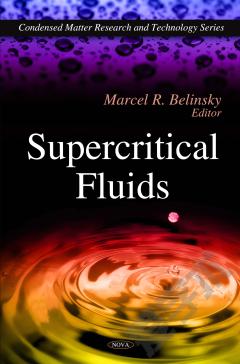Supercritical Fluids
A supercritical fluid is any substance at a temperature and pressure above its critical point. It can diffuse through solids like a gas, and dissolve materials like a liquid. Additionally, close to the critical point, small changes in pressure or temperature result in large changes in density, allowing many properties to be "tuned". Supercritical fluids are suitable as a substitute for organic solvents in a range of industrial and laboratory processes. Carbon dioxide and water are the most commonly used supercritical fluids, being used for decaffeination and power generation respectively. In general terms, supercritical fluids have properties between those of a gas and a liquid. This new and important book gathers the latest research from around the globe in this field of study with a focus on such topics as: the modification and preparation of membrane in supercritical carbon dioxide, supercritical fluid technology applied to the manufacture of prebiotic carbohydrates, the pre-treatment of herbaceous matrix in a process of supercritical fluid extraction, fundamental properties and chemical reactions of supercritical methanol and others.
{{comment.content}}








 京公网安备 11010802027623号
京公网安备 11010802027623号